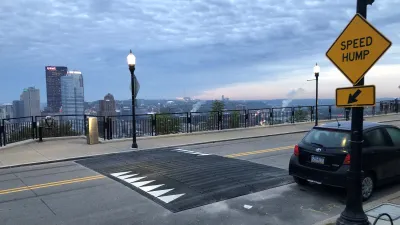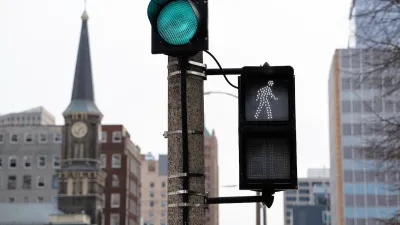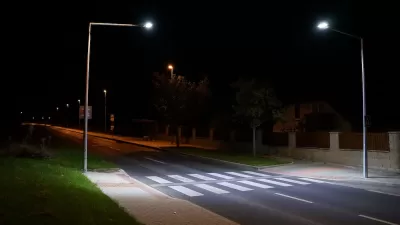The city’s traffic calming initiative has led to a 6 percent average reduction in speeds on corridors with recent interventions.

Pittsburgh’s “Community-driven. Block-by-block. Low cost” traffic calming effort could serve as a useful model for other cities, writes Asia Mieleszko in the Strong Towns journal.
The city focused on quick-build interventions to slow traffic and improve safety on streets nominated by residents as needing more safety measures. “These include raised crosswalks, pedestrian islands, changes to lane widths, chicanes, and most popularly, speed cushions.”
The program has had significant impacts: “On a 1,000-foot segment of Seagirt Street between Nimick Place to Bennett Street the average speed has dropped 13 miles, from 36 to 23 miles per hour, after the installation of speed humps.” The average drop in speed on streets with new traffic calming is 6 miles per hour.
The city’s Department of Mobility and Infrastructure (DOMI) uses discretionary funding for the projects. “Too often, communities feel stuck—waiting for funding, plans, or approvals while dangerous conditions persist. But Pittsburgh proves don’t need a massive budget or a multi-year capital plan to begin making change.”
FULL STORY: Pittsburgh's Low-Cost Traffic Calming Is a Model for Every City

Planetizen Federal Action Tracker
A weekly monitor of how Trump’s orders and actions are impacting planners and planning in America.

USGS Water Science Centers Targeted for Closure
If their work is suspended, states could lose a valuable resource for monitoring, understanding, and managing water resources.

Congress Moves to End Reconnecting Communities and Related Grants
The House Transportation and Infrastructure Committee moved to rescind funding for the Neighborhood Equity and Access program, which funds highway removals, freeway caps, transit projects, pedestrian infrastructure, and more.

Portland Council Tentatively Approves Sidewalk Repair Plan
The proposal would address sidewalk needs in Portland’s District 1 and District 4.

Expanding Access to Design Education at Honolulu Community College
Honolulu Community College’s Architecture, Engineering & Construction Technologies program highlights the role of community colleges in preparing nontraditional students for careers in architectural and construction technologies.

Integrating Human Rights Into Energy and Extractive Sector Transitions
Why just transition efforts must move beyond economic considerations by embedding human rights principles into business practices to ensure equitable, transparent, and accountable outcomes for affected communities and workers.
Urban Design for Planners 1: Software Tools
This six-course series explores essential urban design concepts using open source software and equips planners with the tools they need to participate fully in the urban design process.
Planning for Universal Design
Learn the tools for implementing Universal Design in planning regulations.
City of Moorpark
City of Tustin
Tyler Technologies
City of Camden Redevelopment Agency
City of Astoria
Transportation Research & Education Center (TREC) at Portland State University
Regional Transportation Commission of Southern Nevada
Toledo-Lucas County Plan Commissions





























